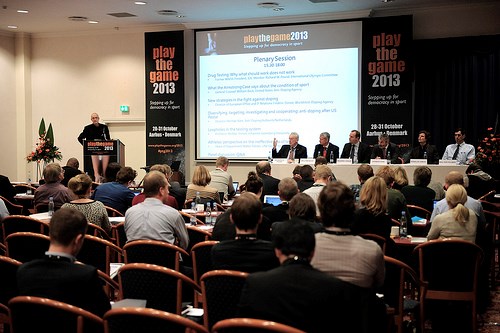The best and worst of Play the Game 2013 – Conference evaluation available for download

Photo: Play the Game / Thomas Søndergaard
19.12.2013
Despite time constraints and the lack of co-financing from foreign partners, Play the Game concludes that it succeeded in organising not only the biggest, but also the best Play the Game conference to date – a view that is supported by an anonymous online questionnaire conducted among the conference participants.
For the first time, the Play the Game conference reached a satisfactory number of participants. Over the four days, 346 participants and around 50 guests from 40 countries and 6 continents took part in the conference, and with a satisfaction rate of 97 percent among the respondents of the questionnaire sent to all conference participants, Play the Game sees the 2013 conference as a success.
Play the Game’s invitation to dialogue with independent observers was accepted by a number of new speakers from the official side, including for instance the head of EU’s Sport Unit, the head of communications for the local organising committee of the FIFA World Cup 2014, FIFA’s director of communications and the director of Interpol’s anti-match-fixing programme.
Moreover the average quality of the presentations was higher than ever among both invited speakers and speakers who were selected based on their submitted abstracts.
On the negative-side, Play the Game did not succeed in improving the gender balance this year despite showing attention, during the preparations for the conference, to the need for a larger number of female speakers.
When looking towards the future it is evident that now, more than ever before, Play the Game is faced with the challenge of providing a forum for constructive discussion and development of solutions to the challenges of international sport without reducing the critical nerve.
Play the Game’s increasing official recognition and participation in various consultative forums must always go hand-in-hand with an active search for information and perspectives that illuminate the true state of sport, even when it happens to differ from the established stances, including those of Play the Game.
The evaluation of the conference is prepared by Play the Game’s staff, and is based on an anonymous internet-based questionnaire (excluding persons affiliated with Play the Game/Danish Institute for Sports Studies), comments and emails from speakers and participants as well as a comprehensive internet search for media coverage of the conference.
Read the full evaluation with more details about the participants’ opinions here





